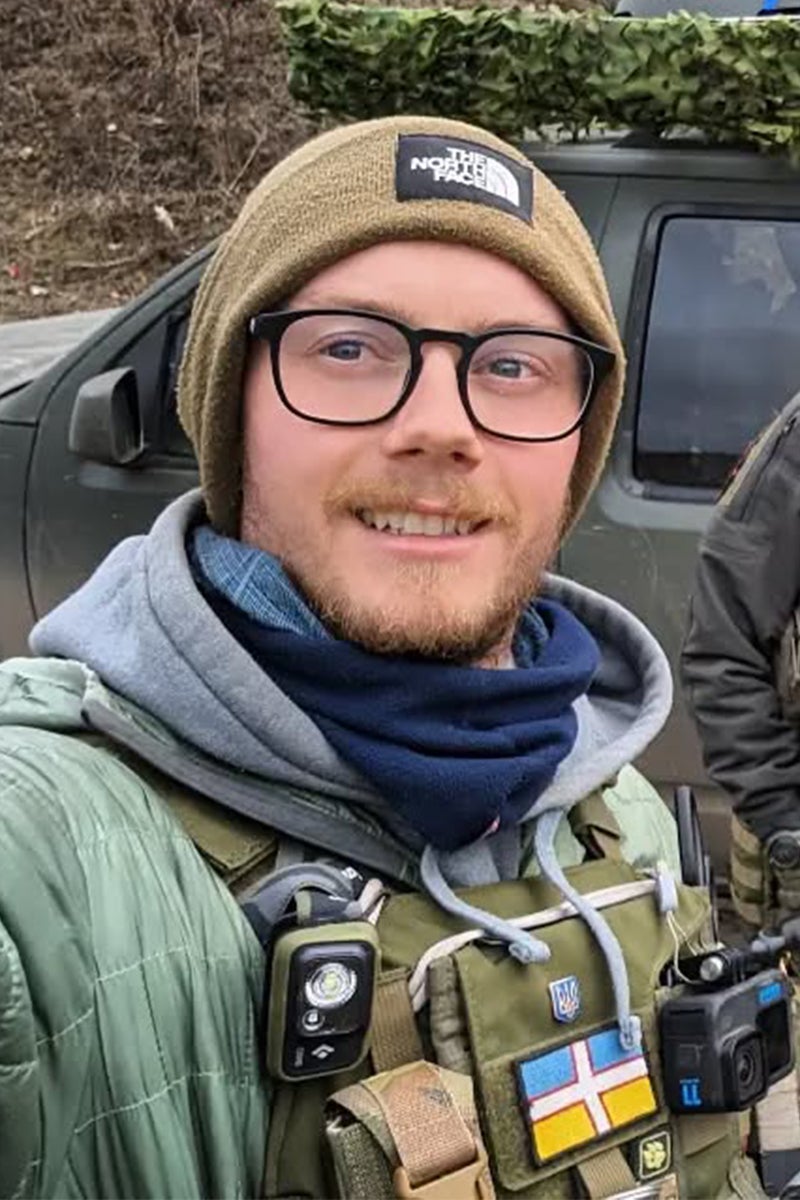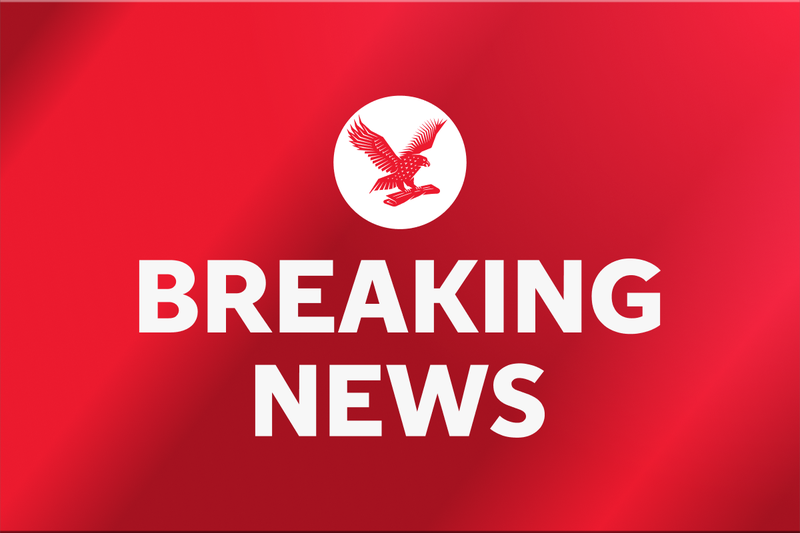‘Fighting with arms and legs is something anyone can do. Fighting without them — that’s a challenge’. The Ukrainian intelligence soldier doesn’t know how long his clinical death lasted after an explosive detonated beneath him. All Andrii Rubliuk remembers is overwhelming cold, darkness and fear. When he regained consciousness in his shattered body — missing both arms and his left leg — excruciating pain engulfed him, and hallucinations clouded his mind.
![[Leonid Lobchuk, a soldier with Ukraine’s 127th brigade who lost a leg in combat in eastern Ukraine]](https://static.independent.co.uk/2025/02/23/05/Russia_Ukraine_War_Amputee_Soldiers_Photo_Gallery_98122.jpg)
“It’s an experience you wouldn’t wish on anyone,” the now 38-year-old says. Two years later, Rubliuk is again dressed in military fatigues, his missing limbs replaced by prosthetics — hooks in place of fingers, one leg firmly planted on an artificial limb.
![[Serhii Pozniak, a sniper unit commander with the 27th national guard brigade, speaks to soldiers during military training]](https://static.independent.co.uk/2025/02/23/05/Russia_Ukraine_War_Amputee_Soldiers_75256.jpg)
From the moment of the explosion, Rubliuk knew his life had changed forever. But one thing was certain — he vowed to return to the battlefield. “Fighting with arms and legs is something anyone can do. Fighting without them — that’s a challenge,” he says. “But only those who take on challenges and fight through them are truly alive.”.
![[Pavlo Romanovskyi, chief of a Ukrainian drone laboratory who lost a leg in battle]](https://static.independent.co.uk/2025/02/23/05/Russia_Ukraine_War_Amputee_Soldiers_Photo_Gallery_34497.jpg)
Many Ukrainian brigades have at least one, and often several, amputee soldiers still on active duty — men who returned to combat out of a sense of duty amid the grim outlook for their country. They are among Ukraine's 380,000 war wounded, according to President Volodymyr Zelenskyy. Some 46,000 soldiers have been killed during the three-year war, and tens of thousands are missing and in captivity.
![[Maksym Vysotskyi, a Ukrainian drone unit commander who lost a leg after stepping on a mine]](https://static.independent.co.uk/2025/02/23/05/Russia_Ukraine_War_Amputee_Soldiers_79761.jpg)
On the front line Russia is expending huge amounts of weaponry and human life to make small but steady territorial gains to the nearly one-fifth of Ukraine it controls. Meanwhile Ukraine, outnumbered and outgunned, faces challenges not only on the battlefield but also in diplomacy, as its once strongest ally — the U.S.— enters talks with Russia, raising fears that Ukraine and its European partners will be sidelined.
![[Ukrainian soldier Oleksandr Zhalinskyi of the Azov brigade, who lost his right arm in battle]](https://static.independent.co.uk/2025/02/23/05/Russia_Ukraine_War_Amputee_Soldiers_55323.jpg)
It is this dire situation that has driven wounded soldiers back to the front, where little has changed since they first left their civilian lives to defend their families from an invading neighbor. For them, lying in a hospital bed was unbearable compared to standing alongside their brothers-in-arms to defend Ukraine. But they all agree on one thing — when the war ends, they won’t spend another day in uniform; joining the army was never their first choice.
![[Oleksandr Puzikov, a captain with Ukraine’s 127th brigade who lost an arm in a Russian mortar attack, trains at a gym]](https://static.independent.co.uk/2025/02/23/05/Russia_Ukraine_War_Amputee_Soldiers_11444.jpg)
Rubliuk rejoined the special forces last spring as a senior sergeant in the Artan intelligence unit, training new soldiers and monitoring enemy drones. His rehabilitation began in late 2022, but he believes it never truly ends. “Every new day is part of my rehabilitation,” he says. His new body, he adds, is a balance between self-acceptance and continuous recovery.
![[A sticker of a wheelchair-bound soldier holding a rifle is seen on the windshield of Oleksandr Puzikov, a captain with Ukraine's 127th brigade who lost an arm in combat, during a drive in Ukraine's Kharkiv region on Feb. 3]](https://static.independent.co.uk/2025/02/23/05/Russia_Ukraine_War_Amputee_Soldiers_38380.jpg)
A comrade who was with Rubliuk when the explosion happened and suffered minor injuries, remembers the moment vividly. “I thought he was dead,” said the soldier who did not give his name in compliance with special forces rules. At that moment, Rubliuk’s life hung in the balance. He was transported to a nearby hospital, suffered cardiac arrest and eventually was resuscitated, said Dr. Anton Yakovenko, a military surgeon who treated him.
![[Ukrainian soldier Oleksandr Zhalinskyi of the Azov brigade, who lost his right arm in battle]](https://static.independent.co.uk/2025/02/23/05/Russia_Ukraine_War_Amputee_Soldiers_Photo_Gallery_38026.jpg)
After months in hospital wards and rehabilitation centers in Philadelphia and Florida, Rubliuk has returned to take on a role near the front line where, like others who have done so, his knowledge and experience are the greatest weapon. Maksym Vysotskyi had just completed a drone mission in November 2023 when he took a detour after heavy rains turned the battlefield into a swamp and stepped on a land mine.
The explosion was instantaneous. When he looked down at his left leg, all he saw was bone. “I quickly accepted the fact that my leg was gone. What’s the point of mourning? Crying and worrying won’t bring it back,” the 42-year-old says. By May, he was back in uniform, describing the feeling as “returning home.”.
“You need to come out of this not as someone broken by the war and written off, but as someone they tried to break, but couldn’t," he says. "You came back, proved you could still do something, and you’ll step away only when you decide to.”. Vysotskyi now commands a team operating explosives-laden drones on nighttime missions. He assesses risk and makes strategic decisions but rarely goes on combat missions. Despite his injury, he has never regretted enlisting.
“Everyone must walk their own path, and there will be challenges along the way. You can try to escape your fate, but it will always catch up with you,” he says. “That’s why I never had regrets.”. Two and a half years ago, when Capt. Oleksandr Puzikov called his wife to tell her his left arm had been severed, she thought he was joking.
“I will never forget that day,” says Iryna Puzikova, her voice trembling. “When I walked into the ICU, his first words were, ‘You won’t leave me, right?’”. She stayed by his side, traveling from hospital to hospital as he recovered and learned to live with a full-arm amputation.






























